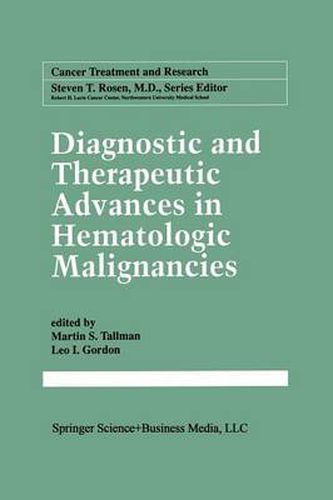Readings Newsletter
Become a Readings Member to make your shopping experience even easier.
Sign in or sign up for free!
You’re not far away from qualifying for FREE standard shipping within Australia
You’ve qualified for FREE standard shipping within Australia
The cart is loading…






This title is printed to order. This book may have been self-published. If so, we cannot guarantee the quality of the content. In the main most books will have gone through the editing process however some may not. We therefore suggest that you be aware of this before ordering this book. If in doubt check either the author or publisher’s details as we are unable to accept any returns unless they are faulty. Please contact us if you have any questions.
There is no field of medicine in which advances in therapy have been so closely linked to a better understanding of molecular medicine than in the area of hematologic malignancies. For example, recent insights into the understanding of Epstein-Barr virus have led to new treatment options for patients with posttransplant lymphoproliferative disorders, as discussed in the chapter by Dr. Richard Ambinder et al. Similarly, Drs. Slack and Gallagher discuss the explosion of recent information regarding the molecular pathogenesis of acute promyelocytic leukemia. This particular morphologic subtype of acute my- eloid leukemia warrants separate discussion because of our increased under- standing of the pathogenesis of leukemia, as well as the dramatic advances in outcome that have occurred with differentiation therapy provided by the vitamin A derivative aW-trans retinoic acid, as discussed in the chapter by Drs. Frankel and Powell. New approaches in the therapy of diffuse aggressive lymphomas in relationship to prognostic factors are discussed by Drs. Koc and Schenkein. Novel approaches to cutaneous T-cell lymphomas are discussed by Drs. Foss and Kuzel. Drs. Fonseca and Greipp discuss prognostic factors in myeloma, which are potentially important since they may serve to identify patients who may benefit from aggressive therapy such as bone marrow trans- plantation, which is discussed in the chapter by Dr. David Vesole. State-of-the-art reviews are provided in the chapters on AIDS-related non- Hodgkin’s lymphoma by Drs. Volm and Von Roenn, adult acute lympho- blastic leukemia by Drs.
$9.00 standard shipping within Australia
FREE standard shipping within Australia for orders over $100.00
Express & International shipping calculated at checkout
This title is printed to order. This book may have been self-published. If so, we cannot guarantee the quality of the content. In the main most books will have gone through the editing process however some may not. We therefore suggest that you be aware of this before ordering this book. If in doubt check either the author or publisher’s details as we are unable to accept any returns unless they are faulty. Please contact us if you have any questions.
There is no field of medicine in which advances in therapy have been so closely linked to a better understanding of molecular medicine than in the area of hematologic malignancies. For example, recent insights into the understanding of Epstein-Barr virus have led to new treatment options for patients with posttransplant lymphoproliferative disorders, as discussed in the chapter by Dr. Richard Ambinder et al. Similarly, Drs. Slack and Gallagher discuss the explosion of recent information regarding the molecular pathogenesis of acute promyelocytic leukemia. This particular morphologic subtype of acute my- eloid leukemia warrants separate discussion because of our increased under- standing of the pathogenesis of leukemia, as well as the dramatic advances in outcome that have occurred with differentiation therapy provided by the vitamin A derivative aW-trans retinoic acid, as discussed in the chapter by Drs. Frankel and Powell. New approaches in the therapy of diffuse aggressive lymphomas in relationship to prognostic factors are discussed by Drs. Koc and Schenkein. Novel approaches to cutaneous T-cell lymphomas are discussed by Drs. Foss and Kuzel. Drs. Fonseca and Greipp discuss prognostic factors in myeloma, which are potentially important since they may serve to identify patients who may benefit from aggressive therapy such as bone marrow trans- plantation, which is discussed in the chapter by Dr. David Vesole. State-of-the-art reviews are provided in the chapters on AIDS-related non- Hodgkin’s lymphoma by Drs. Volm and Von Roenn, adult acute lympho- blastic leukemia by Drs.